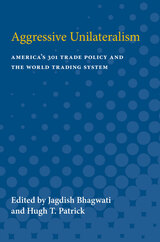
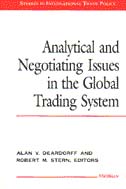

Americans have witnessed inconsistent and seemingly dramatic turnabouts in legislators' attitudes toward trade, with strong bipartisan support for free trade and the Uruguay Round in one instant and heated debate over participation in the World Trade Organization the next. Martha L. Gibson systematically traces the competing forces that interject conflict into an overall consensus on the value of a liberalized trade policy.
Cutting through the tangled web of congressional politics, Gibson shows why it is impossible to understand trade legislation without first understanding how electoral politics and the institutional rules of Congress distort legislators' interests, incentives, and policy goals. Gibson's book clearly shows that trade legislation is not made in a vacuum but is just one in a series of simultaneous games with competing goals in which legislators engage to satisfy the conflicting demands of constituents.

This book will be of interest to scholars studying the judiciary, bureaucracies, and international trade law and administration.
Isaac Unah is Assistant Professor of Political Science, University of North Carolina.

Ryan evaluates the nature and effectiveness of U.S. trade diplomacy with Japan, Korea, Taiwan, and China in the 1970s and 1980s by examining the diplomatic strategies used by the U.S. Trade Representative to enforce Section 301 of the 1974 Trade Act, which was designed to protect free trade and competition through investigations, negotiations, and sanctions.
Ryan shows the different trade diplomacy tactics the East Asian governments pursued during dispute settlement negotiations with the USTR. The study also evaluates the fit between the East Asian political economies and the rules and principles of the General Agreement on Trade and Tariffs (GATT) regime. It explores the capabilities of the multilateral and minilateral regional institutions of trade dispute in the Pacific to settle emerging trade disputes. In the debate over rule-based or power-based diplomacy, Ryan concludes that U.S. trade diplomacy was most successful when it was rule-based, and that it gained significant compliance with GATT and other fair trade agreements.
Ryan interviewed many of the key trade negotiators in Tokyo, Seoul, Taipei, Beijing, and Washington. His analysis is based on the largest, most systematic, market sector-specific data set yet presented on U.S. export trade dispute settlement in the Pacific. It studies the structure of state power, the structures of international business competition in manufacturing, agriculture, and services, the international and regional institutions of trade diplomacy, and the national governmental institutions of trade diplomacy in the Pacific.
Anyone interested in international trade or diplomacy will find this book a source of new insight into the dynamics of trans-Pacific trade.
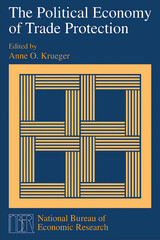
In case studies of trade barriers imposed during the 1980s to help the steel, semiconductor, automobile, lumber, wheat, and textile and apparel industries, the contributors trace the evolution of efforts to obtain protection, protectionist measures, and their results. A chapter assessing the common themes that emerge from the studies concludes that the focus of current trade law is exclusively on the individual protection-seeking industries, with little regard for indirect effects on using industries or for consumers. Reform could usefully take these effects into account.
This volume will interest policymakers, business executives, and anyone interested in trade policy formulation and practice.
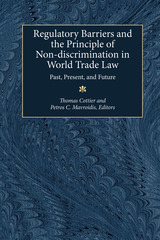
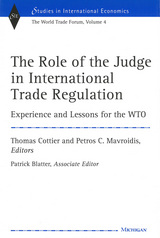
The book develops along three lines: the first a search for cases submitted to the WTO where the judge exceeded its authority; the second a comparison of the WTO with the operations of national judicial systems having different levels of integration, specifically the United States (federal level) and the EC (quasi-federal level); and the third an exploration of directions for the future of dispute settlement in the WTO.
Reflecting the diversity of its contributors, this book addresses questions of economics, political science, and law, bringing an unusual level of multidisciplinarity to this topic and context. It is designed for both academic readers and practitioners, who will find it full of practical insights as well as rich and detailed analysis.
Thomas Cottier is Professor of European and International Economic Law, University of Bern, and Managing Director, World Trade Institute, University of Bern.
Petros C. Mavroidis is Professor of Law, University of Neuchâtel. He formerly worked in the Legal Affairs Division of the World Trade Organization.
Patrick Blatter is Mavroidiss scientific collaborator.
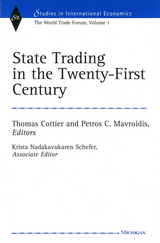
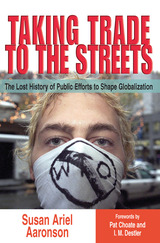
The book explores how trade agreement critics built a fluid global movement to redefine the terms of trade agreements (the international system of rules governing trade) and to redefine how citizens talk about trade. (The "terms of trade" is a relationship between the prices of exports and of imports.) That movement, which has been growing since the 1980s, transcends borders as well as longstanding views about the role of government in the economy. While many trade agreement critics on the left say they want government policies to make markets more equitable, they find themselves allied with activists on the right who want to reduce the role of government in the economy.
Aaronson highlights three hot-button social issues--food safety, the environment, and labor standards--to illustrate how conflicts arise between trade and other types of regulation. And finally she calls for a careful evaluation of the terms of trade from which an honest debate over regulating the global economy might emerge.
Ultimately, this book links the history of trade policy to the history of social regulation. It is a social, political, and economic history that will be of interest to policymakers and students of history, economics, political science, government, trade, sociology, and international affairs.
Susan Ariel Aaronson is Senior Fellow at the National Policy Institute and occasional commentator on National Public Radio's "Morning Edition."
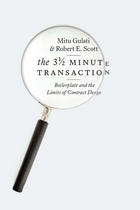
Boilerplate language in contracts tends to stick around long after its origins and purpose have been forgotten. Usually there are no serious repercussions, but sometimes it can cause unexpected problems. Such was the case with the obscure pari passu clause in cross-border sovereign debt contracts, until a novel judicial interpretation rattled international finance by forcing a defaulting sovereign—for one of the first times in the market’s centuries-long history—to repay its foreign creditors. Though neither party wanted this outcome, the vast majority of contracts subsequently issued demonstrate virtually no attempt to clarify the imprecise language of the clause.
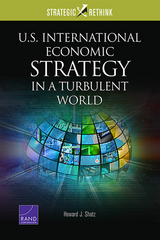
READERS
Browse our collection.
PUBLISHERS
See BiblioVault's publisher services.
STUDENT SERVICES
Files for college accessibility offices.
UChicago Accessibility Resources
home | accessibility | search | about | contact us
BiblioVault ® 2001 - 2024
The University of Chicago Press









